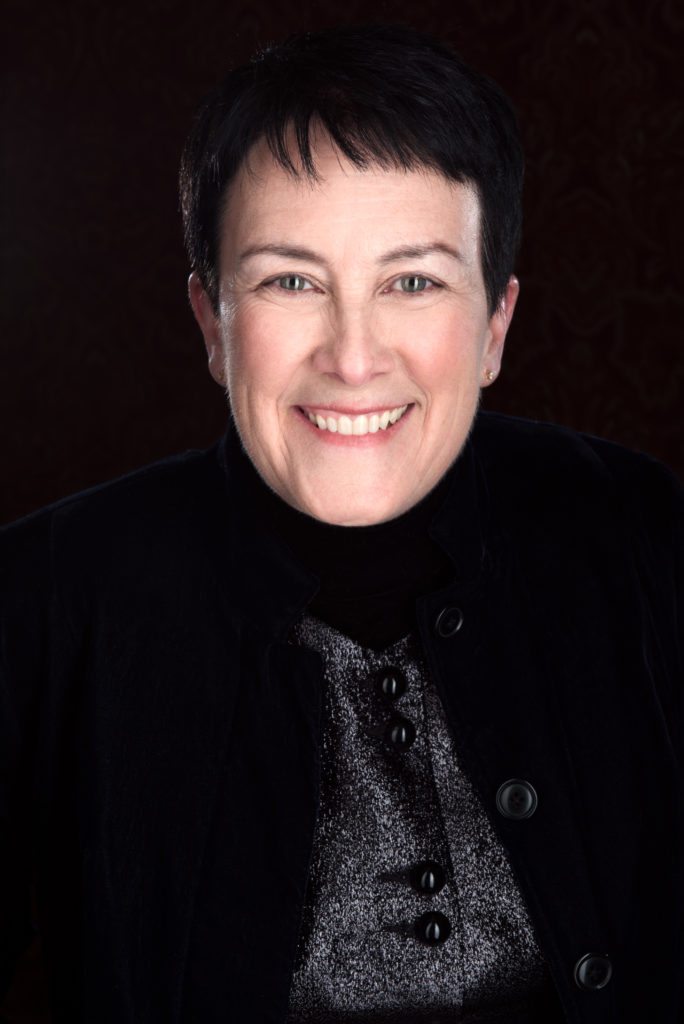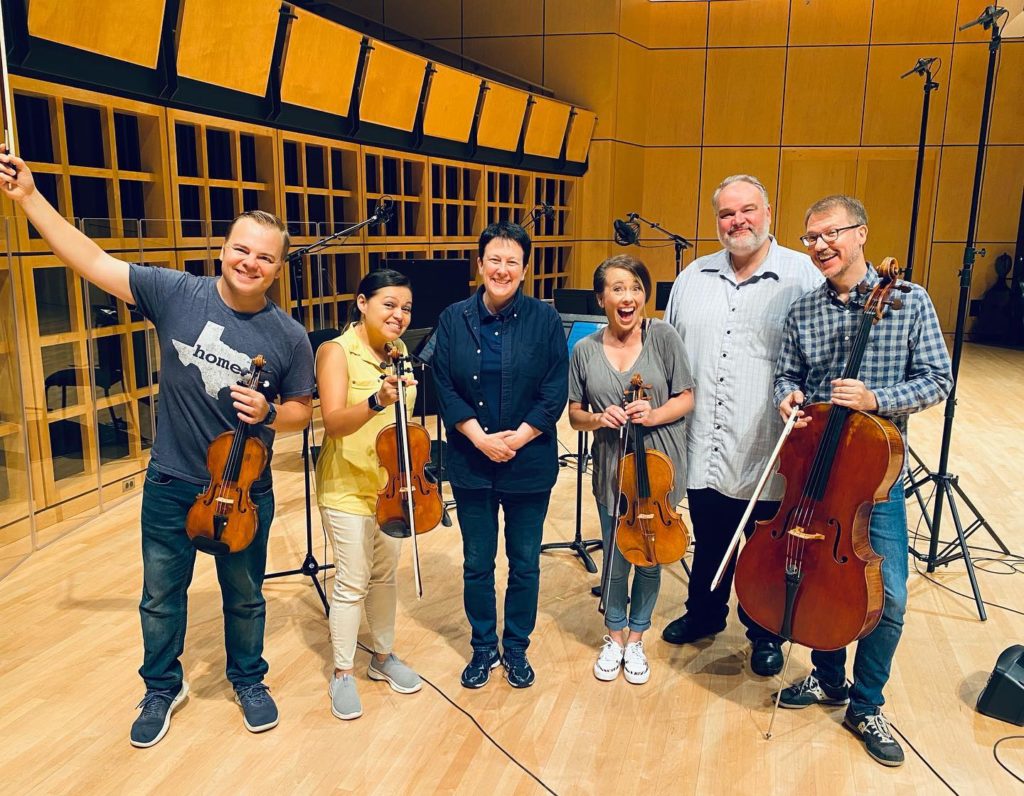
Renowned Lesbian Composer to Premiere Two New Works in Houston
Pulitzer Prize-winner Jennifer Higdon reveals her musical inspirations and approach.

Jennifer Higdon is the most-performed contemporary composer in the world today. Two Houston musical institutions—the Apollo Chamber Players and the Houston Symphony—will premiere two of her works during May.
Apollo, which commissioned Higdon’s string quartet, presents Shadow of the Mountain on May 1 at the Hobby Center. The Houston Symphony presents the world premiere of Higdon’s Duo Duel for Two Percussionists and Orchestra, a Houston Symphony commission, at Jones Hall on May 6–8.
Higdon’s journey through music (and life) has mimicked that of several avant-garde composers, many of whom had lives and relationships outside of conventional norms. Her predecessors at Philadelphia’s famed Curtis Institute of Music included gay composers such as Samuel Barber and Gian Carlo Menotti.
Somewhat surprisingly, Higdon’s upbringing in eastern Tennessee has played a big part in her personal and professional career. She and her wife, Cheryl, love Appalachia, and that region was the inspiration for much of Higdon’s work. “Thematically, the string quartet that Apollo is premiering is based on my first [Civil War-themed] opera, Cold Mountain. Cheryl and I are both very connected to that part of the world. Our shared experiences enable me to delve deeply into this music and subject matter.”
“Cheryl and I met in high school,” Higdon recalls. “We were both flute players, and our school’s band often traveled to competitions. As a result, we spent a lot of time together. Cheryl was two years behind me in high school, but we became close. Our subsequent relationship grew from a very deep understanding of each other. We were good friends for a long time before we became romantically involved.”
Win a pair of tickets to Duo Duel for Two Percussionists and Orchestra here.
The boldness of these women’s decisions was remarkable for that period, and especially since Eastern Tennessee in the late ’70s was not a mecca for LGBTQ individuals, Higdon notes. “We were not out at that time. Neither of us felt safe doing so while in high school. I went off to Bowling Green State University [to study flute] while Cheryl stayed to finish high school. She then came to Bowling Green in 1983. From that point, we were ‘out.’ I’m not sure what prompted us to do it that way, but I never remember having a specific discussion about it—it was just how it had to be.” The couple was finally married by famed conductor Marin Alsop in 2014.
Higdon’s family was very supportive. “My parents were totally fine about it—it wasn’t even a blip on their radar. It was such a ‘non-issue’ in our household that it never occurred to me that anyone else would have a problem.”
Her wife’s experience, however, was a more typical coming-out story. “Cheryl’s family was not happy. They feared for her future and were afraid that she would have to stay hidden. Her entire family lived in the area, and they didn’t really want her to go away to college.” This was difficult for the couple, and especially worrisome for Cheryl. “She was brave in so many ways,” Higdon recalls. “As the first person in her family to attend college, she wanted to live in a way that was true to herself.”

Musicians often speak of their personal and artistic process and the importance of “authenticity.” Similarly, Higdon shares a beautifully candid sentiment about her wife’s profound creative influence: “I’m so fortunate, in that I feel incredibly ‘safe’ within my marriage. As a result, I can be completely vulnerable within the context of my music. This helps me immensely as a composer. I know Cheryl’s love and support is always there. That assurance enables me to [creatively] ‘wear my heart on my sleeve.’ I attribute that to her, entirely—it wouldn’t be possible without her.”
The couple has created a wonderfully efficient division of labor, having established their own publishing company. Consequently, they jointly oversee the making and managing of their musical projects. “It didn’t start out that way,” Higdon remembers, “but the business grew, and [15 years ago] Cheryl left her career to help me. Previously, our jobs required both of us to travel extensively; it often felt as if we were passing each other in the airport! Now we travel together.
“Cheryl is amazingly organized, which is helpful given how much paperwork, planning, and logistics is involved in the composing, presenting, and publishing of music. My brain would much rather be creating things than securing rental cars and hotel rooms!”
During the 28 months it took Higdon to compose her opera Cold Mountain, the stability of her marriage underpinned the entire musical process. “So much of your brain is consumed by composing,” Higdon states. “I would write all day, every day. To maintain the depth of feeling required for such a work, you must draw on your life experience and your relationship. The opera contains several difficult scenes, and at its conclusion one of the main characters is killed. I had spent essentially two years [during the composition process] keeping him ‘alive.’ Upon reaching the point in the libretto where he dies, I spent a solid week simultaneously weeping and composing. I struggled simply because I knew this character [I had created] so well.”
In fact, Higdon had difficulty facing the opera on a daily basis. “It would affect my mood profoundly—often I wasn’t mentally ‘present.’ This meant that Cheryl had to take care of lots of things.”
Higdon’s various commissions are booked through 2025, and her output seems boundless. “I’m continually working. As I complete one piece, my brain is moving on to the next. It’s almost like a spring of water—I don’t stop the flow at any point. Fortunately, I have very specific commissions; I always know who I’m composing for and what they require. I try to learn as much as I can about the performer and the group I’m collaborating with. Using that information, I craft something that I think will be successful.”
The Houston Symphony and Apollo commissions happened concurrently, although their premieres were delayed by the pandemic. Duo Duel is her second major work for percussion and orchestra, while the Shadow quartet is an intensely lyrical retrospective of melodic themes. Since this stylistic musical juxtaposition required Higdon to create two dissimilar works simultaneously, she is fortunate to be able to transition easily between works and genres. “It’s kind of like shifting gears while driving a car,” she says. “Even though the pieces couldn’t have been more different, each one worked well.”

Listeners who are unsure about contemporary music need not fear. Although many of today’s composers focus solely on their specific musical language, irrespective of audience or environment, Higdon’s approach takes a “360-degree view” that encompasses performer, audience, and composer. “I consider music to be a shared experience. I began my musical career as a flute performance major, so I’ve been on both sides of the music stand. Composers have to provide performers with convincing musical ideas; only then can they convey [those ideas] to an audience. Having inhabited each role, I understand the importance of every component. As a composer you must present a story you believe in.”
When creating new works, Higdon does extensive research on specific instruments, players, and existing music that is similar. “Since soloists spend all their time with their instruments, they tend to feel music very intensely. I ask myself: What can I contribute to the repertoire for this instrument or this performer?”
Though steeped in musical scholarship, having studied and taught at Curtis, Higdon has liberated herself from such academic confines. “Art is art, whether you have a degree or not,” she says. “The world’s most famous composers didn’t go to school. A degree is helpful, but it is definitely not the only key to successfully making music.”
Higdon won a Pulitzer Prize in 2010 for a violin concerto she composed, as well as a Grammy for her first percussion concerto. However, many consider her most profound effort to be the orchestral work Blue Cathedral, composed in memory of her brother. Commissioned by Curtis and first performed in 2000, it is one of her most evocative creations.
“Loss is such a huge part of life, especially recently during the pandemic,” Higdon muses. “I composed Blue Cathedral about a year after my brother passed away from cancer. It was very therapeutic, and [it revealed] how this art form comes together to heal and help us. This remains music’s most magical but entirely inexplicable component. I don’t know what or when or how it happens, but audience members often approach me with profound emotional responses. However, none of us are able to pinpoint the exact source or reason for those feelings.”
Indeed, the process by which music is created is an enigma, even among those who excel at the craft. “When you hear your work for the first time, you have no idea what’s going to happen,” Higdon says. “You hold your breath.”
“Years ago, I attended the first rehearsal of Blue Cathedral [with the Curtis Orchestra]. I thought it wouldn’t work. Midway through, Cheryl walked up to me and whispered in my ear, ‘This is the best thing you have ever written.’ It was a truly memorable moment because, in spite of the fact that life is incredibly busy for both of us, Cheryl is part of each piece that I create—every single one.”
Shadow of the Mountain
May 1 premiere by the Apollo Chamber Players
Tickets at apollochamberplayers.org or call the Hobby Center box office at 713-315-2525
Duo Duel for Two Percussionists and Orchestra
May 6–8 premiere by the Houston Symphony
Tickets at houstonsymphony.org or by calling 713-224-7575










